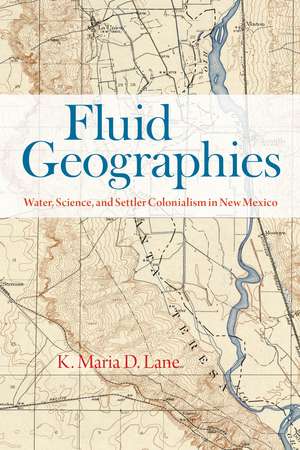Fluid Geographies: Water, Science, and Settler Colonialism in New Mexico
Autor K. Maria D. Laneen Limba Engleză Paperback – 18 iul 2024
Maria Lane’s Fluid Geographies traces New Mexico’s transition from a community-based to an expert-led system of water management during the pre-statehood era. To understand this major shift, Lane carefully examines the primary conflict of the time, which pitted Indigenous and Nuevomexicano communities, with their long-established systems of irrigation management, against Anglo-American settlers, who benefitted from centralized bureaucratic management of water. The newcomers’ system eventually became settled law, but water disputes have continued throughout the district courts of New Mexico’s Rio Grande watershed ever since.
Using a fine-grained analysis of legislative texts and nearly two hundred district court cases, Lane analyzes evolving cultural patterns and attitudes toward water use and management in a pivotal time in New Mexico’s history. Illuminating complex themes for a general audience, Fluid Geographies helps readers understand how settler colonialism constructed a racialized understanding of scientific expertise and legitimized the dispossession of nonwhite communities in New Mexico.
| Toate formatele și edițiile | Preț | Express |
|---|---|---|
| Paperback (1) | 215.52 lei 3-5 săpt. | +16.37 lei 7-13 zile |
| University of Chicago Press – 18 iul 2024 | 215.52 lei 3-5 săpt. | +16.37 lei 7-13 zile |
| Hardback (1) | 620.61 lei 6-8 săpt. | |
| University of Chicago Press – 18 iul 2024 | 620.61 lei 6-8 săpt. |
Preț: 215.52 lei
Nou
Puncte Express: 323
Preț estimativ în valută:
41.24€ • 44.98$ • 34.77£
41.24€ • 44.98$ • 34.77£
Carte disponibilă
Livrare economică 03-17 aprilie
Livrare express 20-26 martie pentru 26.36 lei
Preluare comenzi: 021 569.72.76
Specificații
ISBN-13: 9780226833958
ISBN-10: 022683395X
Pagini: 304
Ilustrații: 9 halftones, 9 tables
Dimensiuni: 152 x 229 x 22 mm
Greutate: 0.43 kg
Editura: University of Chicago Press
Colecția University of Chicago Press
ISBN-10: 022683395X
Pagini: 304
Ilustrații: 9 halftones, 9 tables
Dimensiuni: 152 x 229 x 22 mm
Greutate: 0.43 kg
Editura: University of Chicago Press
Colecția University of Chicago Press
Notă biografică
K. Maria D. Lane is professor of geography and presidential teaching fellow at the University of New Mexico, where she also serves as interim dean of graduate studies. She is the author of Geographies of Mars, also published by the University of Chicago Press.
Cuprins
List of Illustrations
Acknowledgments
One Introduction: Historical Geographies of the Present
Two Settlement: Colonialism in the Aridlands
Three Expertise: Settler Politics and the New Water Management
Four Law: Envisioning an Expert Water Agency
Five Knowledge: Science for Settlement’s Sake
Six Dispute: Navigating Environmental Knowledge in the Courtroom
Seven Displacement: Geographies of Power in an Irrigated Landscape
Eight Conclusion: Settler Colonialism and Its Aftermath
Notes
Bibliography
Index
Acknowledgments
One Introduction: Historical Geographies of the Present
Two Settlement: Colonialism in the Aridlands
Three Expertise: Settler Politics and the New Water Management
Four Law: Envisioning an Expert Water Agency
Five Knowledge: Science for Settlement’s Sake
Six Dispute: Navigating Environmental Knowledge in the Courtroom
Seven Displacement: Geographies of Power in an Irrigated Landscape
Eight Conclusion: Settler Colonialism and Its Aftermath
Notes
Bibliography
Index
Recenzii
"Fluid Geographies tells the origin story of New Mexico’s modernist water-management policy, which today dictates how every state resident accesses water. Underlying this seemingly neutral policy based on expertise is a deep history rooted in Progressive, but racist, ideas about expertise. The arrival of American politicians and engineers in the nineteenth century replaced indigenous and community-based knowledge about how to manage water in a high desert environment, with their scientifically based knowledge. This transition was essential to the successful completion of the settler colonial’s project of controlling the state’s most precious resource: water. Anyone in the American Southwest and West who turns on their tap to get a glass of water or to nourish their garden must read this book. Only then can we understand the complex and tortured route of how water makes it from high up in the mountains and into our homes."
"Much of the commentary on rivers in the west speak to a future crisis as cities continue to expand and water sources become more and more scarce. In Fluid Geographies, Lane shows us how science made the Rio Grande into an object of colonial control. Using historical and legal analysis, Lane accounts for the logic of domination that settlers brought into New Mexico and how their myopic assumptions laid the foundations for water conflict and crisis today."
"This beautifully written book shows us that municipal and agricultural water supplies are never only about water, but also about contested histories and structural inequality. Lane’s careful analysis of settler science, policy, and law reveals engineering infrastructure as a racialized legacy of colonialism: making, and remaking the hydroscape of the U.S. West via dispossession and ecological violence."
"Lane’s remarkable deep reading of nearly two hundred district court cases will undoubtedly be a foundational resource to generations of future researchers. The author’s warning, that 'expert-led laws, agencies, and administrative procedures thus accomplished the dirty work of settler colonialism more effectively and less noticeably than violent military action,' is a timely reminder that the violence of colonizing institutions is as real and lasting as that of their armies."
